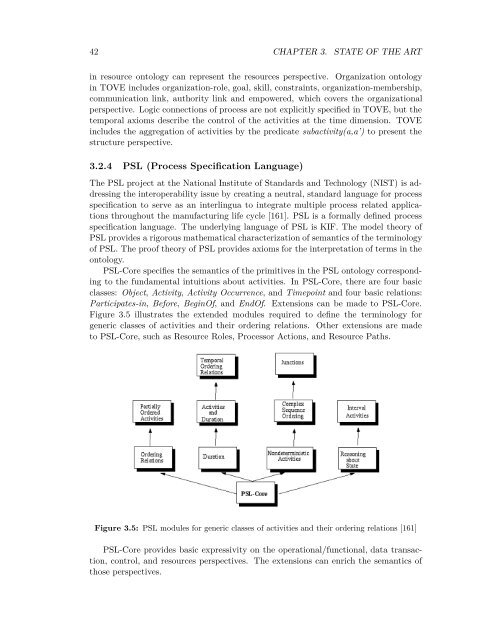Semantic Annotation for Process Models: - Department of Computer ...
Semantic Annotation for Process Models: - Department of Computer ...
Semantic Annotation for Process Models: - Department of Computer ...
Create successful ePaper yourself
Turn your PDF publications into a flip-book with our unique Google optimized e-Paper software.
42 CHAPTER 3. STATE OF THE ART<br />
in resource ontology can represent the resources perspective. Organization ontology<br />
in TOVE includes organization-role, goal, skill, constraints, organization-membership,<br />
communication link, authority link and empowered, which covers the organizational<br />
perspective. Logic connections <strong>of</strong> process are not explicitly specified in TOVE, but the<br />
temporal axioms describe the control <strong>of</strong> the activities at the time dimension. TOVE<br />
includes the aggregation <strong>of</strong> activities by the predicate subactivity(a,a’) to present the<br />
structure perspective.<br />
3.2.4 PSL (<strong>Process</strong> Specification Language)<br />
The PSL project at the National Institute <strong>of</strong> Standards and Technology (NIST) is addressing<br />
the interoperability issue by creating a neutral, standard language <strong>for</strong> process<br />
specification to serve as an interlingua to integrate multiple process related applications<br />
throughout the manufacturing life cycle [161]. PSL is a <strong>for</strong>mally defined process<br />
specification language. The underlying language <strong>of</strong> PSL is KIF. The model theory <strong>of</strong><br />
PSL provides a rigorous mathematical characterization <strong>of</strong> semantics <strong>of</strong> the terminology<br />
<strong>of</strong> PSL. The pro<strong>of</strong> theory <strong>of</strong> PSL provides axioms <strong>for</strong> the interpretation <strong>of</strong> terms in the<br />
ontology.<br />
PSL-Core specifies the semantics <strong>of</strong> the primitives in the PSL ontology corresponding<br />
to the fundamental intuitions about activities. In PSL-Core, there are four basic<br />
classes: Object, Activity, Activity Occurrence, and Timepoint and four basic relations:<br />
Participates-in, Be<strong>for</strong>e, BeginOf, and EndOf. Extensions can be made to PSL-Core.<br />
Figure 3.5 illustrates the extended modules required to define the terminology <strong>for</strong><br />
generic classes <strong>of</strong> activities and their ordering relations. Other extensions are made<br />
to PSL-Core, such as Resource Roles, <strong>Process</strong>or Actions, and Resource Paths.<br />
Figure 3.5: PSL modules <strong>for</strong> generic classes <strong>of</strong> activities and their ordering relations [161]<br />
PSL-Core provides basic expressivity on the operational/functional, data transaction,<br />
control, and resources perspectives. The extensions can enrich the semantics <strong>of</strong><br />
those perspectives.
















